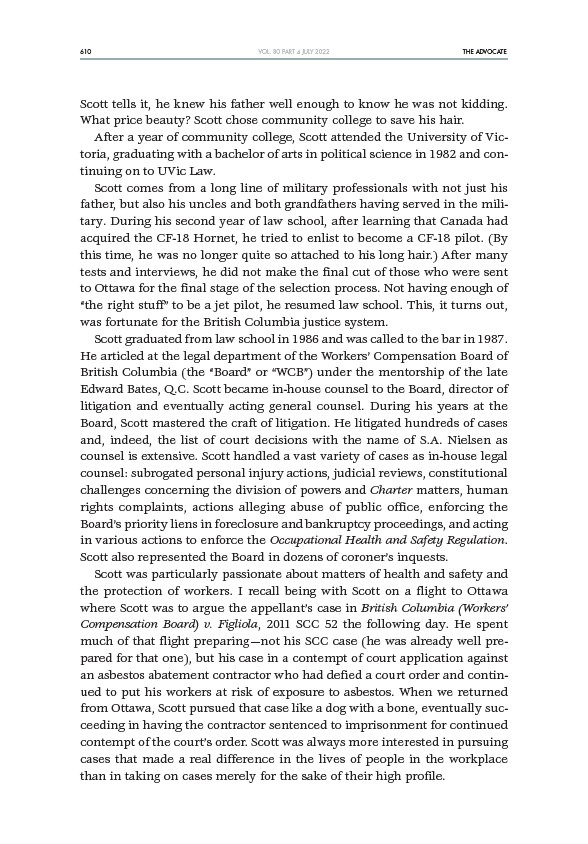
610 THE ADVOCATE
VOL. 80 PART 4 JULY 2022
Scott tells it, he knew his father well enough to know he was not kidding.
What price beauty? Scott chose community college to save his hair.
After a year of community college, Scott attended the University of Victoria,
graduating with a bachelor of arts in political science in 1982 and continuing
on to UVic Law.
Scott comes from a long line of military professionals with not just his
father, but also his uncles and both grandfathers having served in the military.
During his second year of law school, after learning that Canada had
acquired the CF-18 Hornet, he tried to enlist to become a CF-18 pilot. (By
this time, he was no longer quite so attached to his long hair.) After many
tests and interviews, he did not make the final cut of those who were sent
to Ottawa for the final stage of the selection process. Not having enough of
“the right stuff” to be a jet pilot, he resumed law school. This, it turns out,
was fortunate for the British Columbia justice system.
Scott graduated from law school in 1986 and was called to the bar in 1987.
He articled at the legal department of the Workers’ Compensation Board of
British Columbia (the “Board” or “WCB”) under the mentorship of the late
Edward Bates, Q.C. Scott became in-house counsel to the Board, director of
litigation and eventually acting general counsel. During his years at the
Board, Scott mastered the craft of litigation. He litigated hundreds of cases
and, indeed, the list of court decisions with the name of S.A. Nielsen as
counsel is extensive. Scott handled a vast variety of cases as in-house legal
counsel: subrogated personal injury actions, judicial reviews, constitutional
challenges concerning the division of powers and Charter matters, human
rights complaints, actions alleging abuse of public office, enforcing the
Board’s priority liens in foreclosure and bankruptcy proceedings, and acting
in various actions to enforce the Occupational Health and Safety Regulation.
Scott also represented the Board in dozens of coroner’s inquests.
Scott was particularly passionate about matters of health and safety and
the protection of workers. I recall being with Scott on a flight to Ottawa
where Scott was to argue the appellant’s case in British Columbia (Workers’
Compensation Board) v. Figliola, 2011 SCC 52 the following day. He spent
much of that flight preparing—not his SCC case (he was already well prepared
for that one), but his case in a contempt of court application against
an asbestos abatement contractor who had defied a court order and continued
to put his workers at risk of exposure to asbestos. When we returned
from Ottawa, Scott pursued that case like a dog with a bone, eventually succeeding
in having the contractor sentenced to imprisonment for continued
contempt of the court’s order. Scott was always more interested in pursuing
cases that made a real difference in the lives of people in the workplace
than in taking on cases merely for the sake of their high profile.